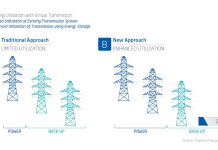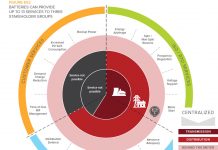Here’s some political context for my article on Energy Storage for the Smart Grid.
For the moment, the Senate version of The American Recovery and Reinvestment Act of 2009 includes:
"For an additional amount for `Energy Efficiency and Renewable Energy’, $14,398,000,000, for necessary expenses, to remain available until September 30, 2010: * * * Provided further, That $2,000,000,000 shall be available for grants for the manufacturing of advanced batteries and components and the Secretary shall provide facility funding awards under this section to manufacturers of advanced battery systems and vehicle batteries that are produced in the United States, including advanced lithium ion batteries, hybrid electrical systems, component manufacturers, and software designers:
* * *
For an additional amount for `Electricity Delivery and Energy Reliability’, $4,500,000,000, for necessary expenses, to remain available until September 30, 2010:
* * *
For capital expenditures and necessary expenses of acquiring motor vehicles with higher fuel economy, including: hybrid vehicles; neighborhood electric vehicles; electric vehicles; and commercially-available, plug-in hybrid vehicles, $600,000,000, to remain available until September 30, 2011."
While there are any number of provisions in the Senate Bill that have the population and the politicians up in arms, the incentives for the battery sector seem to be firmly in place and are not likely to change much.
Two billion in outright grants for battery manufacturing is immense. The fact that there is good reason to believe grid-storage should be treated as a separate sub-class under the $4.5 billion Electricity Delivery and Energy Reliability appropriation is also encouraging. When you figure that battery systems will probably represent 1/4 to 1/3 of the $600 million EV acquisition appropriation, the impact on a handful of stocks will almost certainly exceed anyone’s wildest imagination.
John Petersen, Esq.
John L. Petersen, Esq. is a U.S. lawyer based in Switzerland who works as a partner in the law firm of Fefer Petersen & Cie and represents North American, European and Asian clients, principally in the energy and alternative energy sectors. His international practice is limited to corporate securities and small company finance, where he focuses on guiding small growth-oriented companies through the corporate finance process, beginning with seed stage private placements, continuing through growth stage private financing and concluding with a reverse merger or public offering. Mr. Petersen is a 1979 graduate of the Notre Dame Law School and a 1976 graduate of Arizona State University. He was admitted to the Texas Bar Association in 1980 and licensed to practice as a CPA in 1981. From January 2004 through January 2008, he was securities counsel for and a director of Axion Power International, Inc. a small public company involved in advanced lead-acid battery research and development.








A while back I remember this website mentioned CPTC, and that you would wait to see the stimulus package before buying more shares.
What do you think now about CPTC and how the stimulus package might help that company and possibly be a good investment?
A while back I remember this website mentioned CPTC, and that you would wait to see the stimulus package before buying more shares.
What do you think now about CPTC and how the stimulus package might help that company and possibly be a good investment?
The stimulus helped transmission, but not nearly as much as it deserved… a lot more money was put into the (also deserving) Smart Grid, but transmission was relatively neglected. For me, this was the one big dissapointment in the stimulus. That and the fact that the Republicans decided to grandstand rather than working with the Dems to craft a better bill.
Composite Technology Corp (CPTC) may see some gain from the bill, but the difficulty of raising new finance will probably hurt the company more than the stimuls helps. I decided to sell.